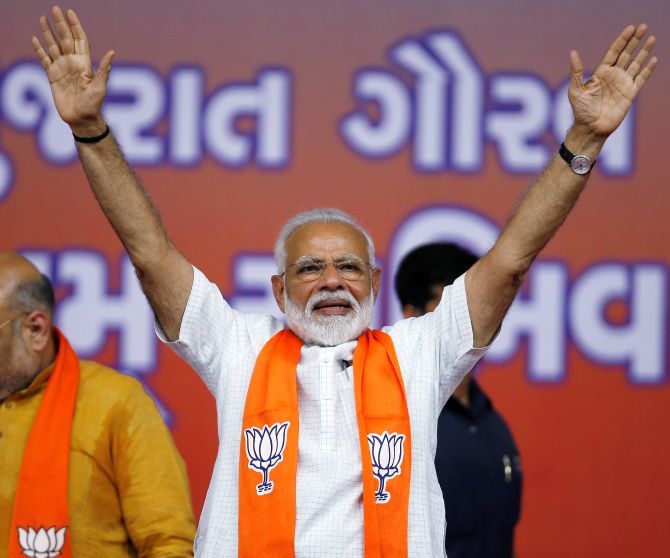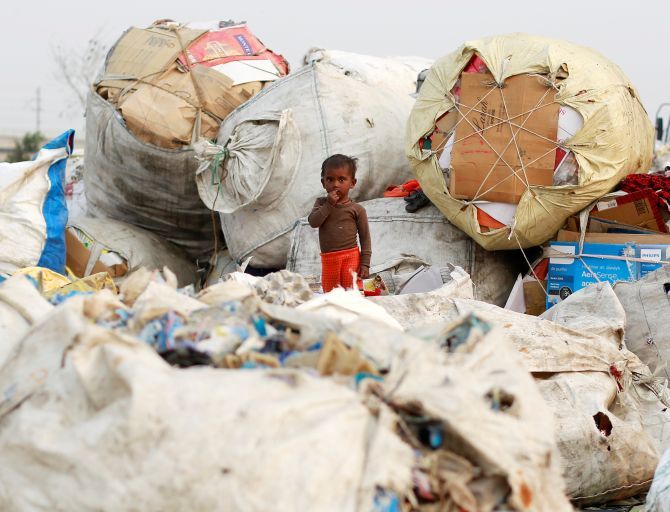Can Modi enthuse BJP workers to pursue the end of single-use plastic with the same vigour and enthusiasm as they celebrated the attack on a neighbour, asks Aditi Phadnis.

In June 2018, when Narendra Modi unexpectedly announced on World Environment Day that India would adopt policies to become single-use plastic free by 2022, everyone sniggered, and with some justification. How could the prime minister even think he could keep his promise, given the political economy of single-use plastic? Some state governments have announced their own bans. But for the most part, these are meaningless because they are observed more in their breach.
On August 15, in his Independence Day speech, Modi repeated the pledge: To drive out single-use plastic from India. For this, he must be lauded. But enforcing the pledge is easier said than done.
The story of the plastics issue in India is twofold. On the one hand, a combination of government initiatives and efforts including construction, the rise in demand for automobiles and modernisation in irrigation has created significant new opportunities for plastic products. On the other hand, there is growing awareness of the subsequent pollution issues in a highly cost-sensitive market dominated by unorganised and small players largely protected by political interests.
Scholars have explained the difference in the way the plastics economy has grown and developed in India and the West. It is evident from the attention paid to the after-use of plastic.
In the West, the proliferation in polymers and products began in the 1950s when there was little awareness of the challenge of post-use or after-use plastics waste.
But in India, the growth in the plastics industry has more or less coincided with a proactive environmental consciousness movement of the 1970s and 1980s.
So, with every incremental unit of growth of the industry, pollution-related reputational risk to companies using these products also grows. However, the formal recycling industry is unable to keep pace, in large part, because there are no incentives.

The most telling statistic comes from the packaging materials sector in Delhi, the most popular sector in the plastics industry: In the national capital, 660 entities are dedicated to making single-use plastics, and 1,242 entities are plastics importers and exporters in this category. However, there are only 272 entities formally engaged in plastics recycling and re-processing, research by NGOs reveals.
Three of the world’s 10 rivers that carry 90 per cent of the plastic to the world’s oceans are in India -- the Indus, the Ganga and the Brahmaputra.
According to a January 2015 report by the Central Pollution Control Board, every day, Indian cities generate 15,000 tonnes of plastic waste -- enough to fill 1,500 trucks, at 10 tonnes per truck -- of which 9,000 tonnes are collected and processed/recycled, while the remaining 6,000 tonnes, or 600 truckloads, usually litter drains, streets or are dumped in landfills.
About 66 per cent of the plastic waste is mixed waste -— polybags and pouches used to pack food, mainly from residential localities, the CPCB report said.
Delhi produces the most plastics waste in the country, followed by Kolkata and Ahmedabad.
Answering a question raised on plastics waste in the Lok Sabha in 2017, Minister of State for Environment, Mahesh Sharma, cited the CPCB study to inform parliamentarians that these cities together produced 4,059 tonnes a day.
The biggest hurdle to plastics recycling and waste management is non-segregation of waste at the disposal source but the problem varies by location; plastics are estimate to comprise 12.47 per cent of municipal solid waste in the city of Surat, while only 3.1 per cent of Chandigarh city’s solid waste is plastics.
PET bottles can be recycled most easily but wastepickers have little or no incentive to collect plastic bags despite the growing volumes: Collecting 1 kg of lightweight plastic carry bags involves so much labour and returns are so low that it is not worth the effort.
Meanwhile, small manufacturers of single-use plastic are out on the streets.
The Maharashtra Plastic and Thermocol (manufacture, usage, sale, transport, handling, and storage) Products Notification, which restricts plastic bags and cutlery as well as plastic packaging, was notified in March 2018, the last state to do so.
But its notification saw a widespread and tough crackdown on manufacturers as well as users of single-use plastic -- without suggesting alternatives or replacement. The ban was not only on the manufacture, sale, and use of throwaway plastic items such as bags, plates, cutlery, straws, and small bottles, but also on retail packaging and Styrofoam. And penalties for manufacturing and selling these items included fines and jail terms of up to three months.
Within the first week of the ban, more than 300 plastic bag manufacturers reportedly had to close, throwing thousands of people out of work. Within a week -- after pleas from plastic manufacturers, milk suppliers, small traders, consumer giants like Pepsi and Coca-Cola, and e-commerce companies like Amazon -- the government relaxed the rules, exempting small traders and granting more time for bigger players to come up with solutions for retail packaging, including alternative materials and recycling schemes.
Ending single-use plastic is the real test of Narendra Modi’s leadership.
Leading surgical strikes on Pakistan is easier because the Indian defence forces are on hand to carry out the job. But can Modi enthuse BJP workers to pursue the end of single-use plastic with the same vigour and enthusiasm as they celebrated the attack on a neighbour?











